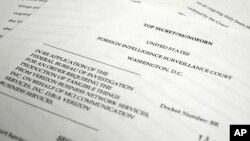News accounts and officials said U.S. intelligence agencies have been peering into the servers used by nine major Internet companies and tracking millions of phone calls. Among them are Microsoft, Google, Yahoo, Facebook, Skype and Apple. All of the tech companies have denied any affiliation with PRISM.
They have also been tracking the source and destination of millions of phone calls, though apparently not listening to the conversations.
As all of this information zooms around the Internet on fiber optic cables, officials are using a program called "PRISM" to sort through and analyze data. Officials said they are searching for links to known or suspected terrorists, and seeking patterns that might reveal something about planned attacks.
The Internet companies deny they are voluntarily participating in any government data collection, and say they only give the government what is required by law.
The computer analysis is possible because Internet communications by e-mail, chat, video or file transfer are all converted into a stream of ones and zeros and broken into little packets.
Each of the packets contains the unique computer addresses of the sender and receiver, and the sequential number, so that the message can be reassembled at the destination in the correct order.
The majority of Internet communications actually flows through the United States, because computers do not necessarily use the shortest route between them, but the easiest and cheapest one.
For instance, the optical cables between Europe and North America can transfer many more packets than cables between Europe and Latin America, which makes it easier to move this traffic. It also makes it easier for U.S. intelligence agencies to monitor these communications.
According to an article in The Guardian, U.S. phone communications giant Verizon was ordered to provide the U.S. National Security Agency (NSA) 'metadata' on all calls going through its network within the United States and with other countries. The collected 'metadata' does not contain actual conversations, but can still be useful to investigators.
'Targeted data mining'
Metadata contains phone numbers, area codes, GPS data, and time and duration of calls. It may also identify phone models and other technical information.
Once in the possession of the NSA, all collected data can be stored in data warehouses - huge memory banks - where it can be analyzed and cross-referenced by sophisticated software which can decipher usage patterns.
The professional term is 'targeted data mining.' However, there is no evidence that collecting and analyzing it are effective tools.
In an interview with VOA, Elizabeth Goitein, co-director of the Liberty and National Security Program at the Brennan Center for Justice, said the NSA is collecting much more data than it needs.
She said if the government wants to know who the suspected or known terrorist is communicating with, it can do that by getting the telephone records of the individuals it wants to investigate.
Without confirming the story, a senior Obama administration official defended the practice as part of the provisions of the Patriot Act, the law passed by Congress after the 2001 terrorist attacks on the United States.
They have also been tracking the source and destination of millions of phone calls, though apparently not listening to the conversations.
As all of this information zooms around the Internet on fiber optic cables, officials are using a program called "PRISM" to sort through and analyze data. Officials said they are searching for links to known or suspected terrorists, and seeking patterns that might reveal something about planned attacks.
The Internet companies deny they are voluntarily participating in any government data collection, and say they only give the government what is required by law.
The computer analysis is possible because Internet communications by e-mail, chat, video or file transfer are all converted into a stream of ones and zeros and broken into little packets.
Each of the packets contains the unique computer addresses of the sender and receiver, and the sequential number, so that the message can be reassembled at the destination in the correct order.
The majority of Internet communications actually flows through the United States, because computers do not necessarily use the shortest route between them, but the easiest and cheapest one.
For instance, the optical cables between Europe and North America can transfer many more packets than cables between Europe and Latin America, which makes it easier to move this traffic. It also makes it easier for U.S. intelligence agencies to monitor these communications.
According to an article in The Guardian, U.S. phone communications giant Verizon was ordered to provide the U.S. National Security Agency (NSA) 'metadata' on all calls going through its network within the United States and with other countries. The collected 'metadata' does not contain actual conversations, but can still be useful to investigators.
'Targeted data mining'
Metadata contains phone numbers, area codes, GPS data, and time and duration of calls. It may also identify phone models and other technical information.
Once in the possession of the NSA, all collected data can be stored in data warehouses - huge memory banks - where it can be analyzed and cross-referenced by sophisticated software which can decipher usage patterns.
The professional term is 'targeted data mining.' However, there is no evidence that collecting and analyzing it are effective tools.
In an interview with VOA, Elizabeth Goitein, co-director of the Liberty and National Security Program at the Brennan Center for Justice, said the NSA is collecting much more data than it needs.
She said if the government wants to know who the suspected or known terrorist is communicating with, it can do that by getting the telephone records of the individuals it wants to investigate.
Without confirming the story, a senior Obama administration official defended the practice as part of the provisions of the Patriot Act, the law passed by Congress after the 2001 terrorist attacks on the United States.





